考研英语阅读理解精读100篇之经济类
- 格式:doc
- 大小:376.50 KB
- 文档页数:64
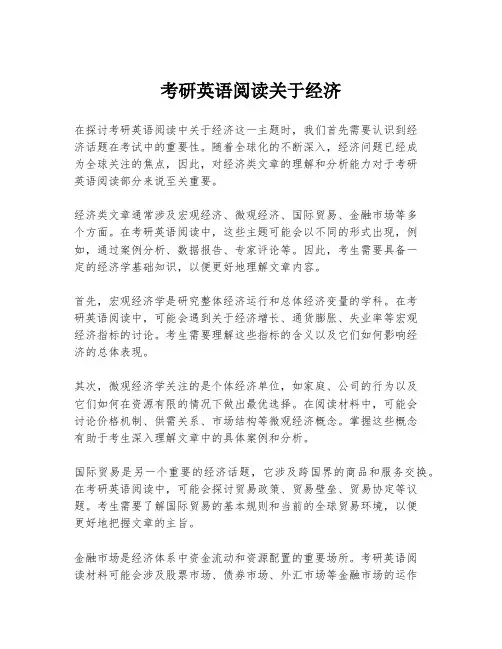
考研英语阅读关于经济在探讨考研英语阅读中关于经济这一主题时,我们首先需要认识到经济话题在考试中的重要性。
随着全球化的不断深入,经济问题已经成为全球关注的焦点,因此,对经济类文章的理解和分析能力对于考研英语阅读部分来说至关重要。
经济类文章通常涉及宏观经济、微观经济、国际贸易、金融市场等多个方面。
在考研英语阅读中,这些主题可能会以不同的形式出现,例如,通过案例分析、数据报告、专家评论等。
因此,考生需要具备一定的经济学基础知识,以便更好地理解文章内容。
首先,宏观经济学是研究整体经济运行和总体经济变量的学科。
在考研英语阅读中,可能会遇到关于经济增长、通货膨胀、失业率等宏观经济指标的讨论。
考生需要理解这些指标的含义以及它们如何影响经济的总体表现。
其次,微观经济学关注的是个体经济单位,如家庭、公司的行为以及它们如何在资源有限的情况下做出最优选择。
在阅读材料中,可能会讨论价格机制、供需关系、市场结构等微观经济概念。
掌握这些概念有助于考生深入理解文章中的具体案例和分析。
国际贸易是另一个重要的经济话题,它涉及跨国界的商品和服务交换。
在考研英语阅读中,可能会探讨贸易政策、贸易壁垒、贸易协定等议题。
考生需要了解国际贸易的基本规则和当前的全球贸易环境,以便更好地把握文章的主旨。
金融市场是经济体系中资金流动和资源配置的重要场所。
考研英语阅读材料可能会涉及股票市场、债券市场、外汇市场等金融市场的运作机制和相关政策。
考生需要对金融市场的基本概念和功能有一定的了解,这样才能准确把握文章的要点。
最后,考生在准备考研英语阅读时,还应该注意培养自己的批判性思维能力。
这意味着不仅要理解文章中的观点和论据,还要能够分析和评估这些观点的合理性。
通过这种方式,考生可以更全面地理解经济类文章,提高自己的阅读和分析能力。
综上所述,考研英语阅读中关于经济的文章要求考生具备一定的经济学知识,并且能够运用批判性思维来分析和理解文章内容。
通过系统地学习和练习,考生可以提高自己在这一领域的阅读能力,为考研英语的成功打下坚实的基础。
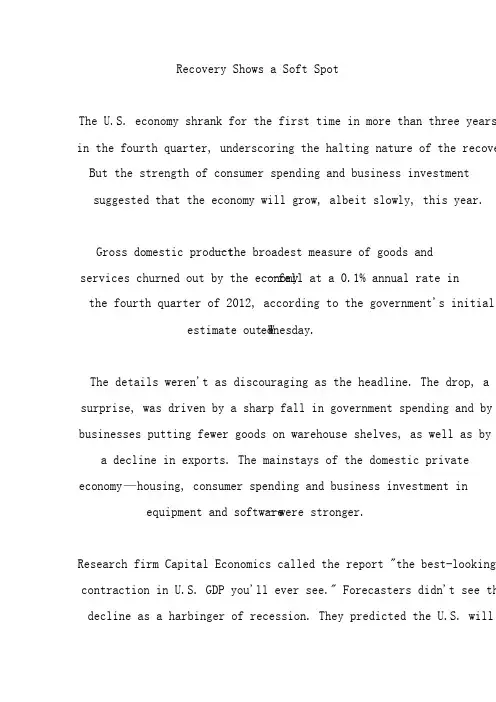
Recovery Shows a Soft SpotThe U.S. economy shrank for the first time in more than three years in the fourth quarter, underscoring the halting nature of the recove But the strength of consumer spending and business investment suggested that the economy will grow, albeit slowly, this year.—the broadest measure of goods and Gross domestic productservices churned out by the economy—fell at a 0.1% annual rate inthe fourth quarter of 2012, according to the government's initialednesday.estimate out WThe details weren't as discouraging as the headline. The drop, a surprise, was driven by a sharp fall in government spending and by businesses putting fewer goods on warehouse shelves, as well as bya decline in exports. The mainstays of the domestic private economy—housing, consumer spending and business investment in—were stronger.equipment and softwareResearch firm Capital Economics called the report "the best-looking contraction in U.S. GDP you'll ever see." Forecasters didn't see th decline as a harbinger of recession. They predicted the U.S. willexpand at around a 2% pace in the current quarter, though the mood could shift Friday when the government releases its monthlysnapshot of the job market.Enlarge ImageClose.Investors pushed down stock prices but didn't seem overly worried either. The Dow Jones Industrial Average, which has been climbing steadily in past weeks, fell 44 points, to close at 13910.4Acknowledging the fourth-quarter economic stall, Federal Reserveednesday to continue their $85 billion-per-month officials decided Wbond-buying programs in an effort to push down long-term interest rates and stimulate economic growth.ednesday's meeting, Fed policy makers saidIn their statement after Wit appears that "growth in economic activity paused in recent month in large part because of weather-related disruptions and other transitory factors." The Fed said it still saw downside risks to t economy, even though it expected a return to moderate growth in themonths ahead.The U.S. joined other advanced economies in reporting contractions in the final months of last year. The U.K., Germany, Spain and Belgium have said their economies shrank in the fourth quarter, and several more euro-zone members in coming weeks are expected to report their own declines. Budget cuts appear to be a leading facto driving the contractions in many of those nations.Deficit cutting in advanced economies is an important reason why global growth is expected to barely improve this year. The International Monetary Fund last week projected global growth of just 3.5% this year, a slight pickup from the estimated 3.2% growth in 2012, due partly to budget tightening in the U.S. and Europe. The International Monetary Fund expects advanced economies to expand just 1.4% this year, compared with 5.5% growth among developingeconomies.W ednesday's GDP report portrayed an economy stuck in low gear.For 2012, the economy grew 2.2%, up from the 1.8% growth of 2011, but still below the roughly 3% pace notched during healthiertimes.For now, the economy is riding largely on the backs of consumers.Consumer spending, adjusted for inflation, increased at a 2.2% rate in the fourth quarter, up from 1.6% in the third. That included a ju in spending on durable goods, which are big-ticket items such ascars and refrigerators.One thing that is helping consumers: They are starting to see substantial income gains after years of stagnation. The GDP report showed after-tax income rose at a rate of 6.8%, adjusted for inflat the fastest pace since the recession.One company benefiting from stronger consumer spending isNando'sPeri-Peri USA, a closely held chain of chicken restaurants in the W ashington, D.C., area. Same-store sales rose roughly 5% in the final months of 2012 compared with a year ago, said ChiefExecutive Burton Heiss.Mr. Heiss said he believes consumers are feeling more secure as housing and other parts of the economy improve. Higher home prices, for example, might be giving consumers the confidence to spend more freely on going out. Mr. Heiss added that the strength seems to be continuing: Sales have picked up slightly since the staof the year.U.S. companies stepped up investment in equipment and software during the quarter, with business investment rising at a rate of 8.4 the strongest pace in a year. That defied expectations that companie would pull back due to worries over the "fiscal cliff" budget dispuin W ashington.Still, those factors weren't strong enough to overcome declines in federal spending and exports and slower inventory growth.The slower inventory investment was the biggest factor behind the contraction. Businesses essentially sold items from warehouseshelves, rather than placing new orders with manufacturers.That may have been due to inventory accumulating too quickly last summer and some businesses becoming extra cautious about restocking. The upside is that with inventory levels now depleted, many businesses will be forced to replenish, possibly boostinggrowth in the current quarter.Meanwhile, government spending, which has been a drag on growthfor more than two years, declined for the ninth time in 10 quartersThe biggest cuts came in military spending, which tumbled at a rate of 22.2%, the largest drop since 1972. But state and local spending also fell, dashing hopes of stabilization after a rare increase inthird quarter.Military analysts said the decline likely was a result of pressure the Pentagon from a number of areas.Among them: reductions in spending on the war in Afghanistan as it winds down, a downturn in planned military spending, a constraint placed on the Pentagon budget because the federal government is operating on short-term resolutions that limit spending growth, as well as concern that further cuts may be in the pipeline.Pentagon officials already have imposed tighter controls on military spending to deal with the challenges.David Berteau, a former Defense Department official who now heads the International Security Program at the Center for Strategi and International Studies in Washington, said he was surprised bythe sharp drop and predicted that persistent uncertainty about the defense budget would continue to be a drag on the nationaleconomy."Is this a blip in the data or is it a trend?" he said. "I think yseeing a trend."The effect of defense cuts on the economy in the fourth quarter likely raises the stakes of looming budget fights between the White House and congressional Republicans. The White House said the GDP report showed the need for Congress to avoid "self-inflictedwounds" and reach a deal.Companies tied to the defense industry already are bracing for cutsNoel McCormick, president of McCormick Stevenson, a small engineering firm in Clearwater, Fla., that designs weapons for major defense contractors, said big clients have told him they may resort layoffs and cut spending if cuts happen.That would have a "tremendous" impact on McCormick's 12-person company, he said, likely causing it to cut back as well."There is a great deal of angst associated in the coming months," MrMcCormick said.。
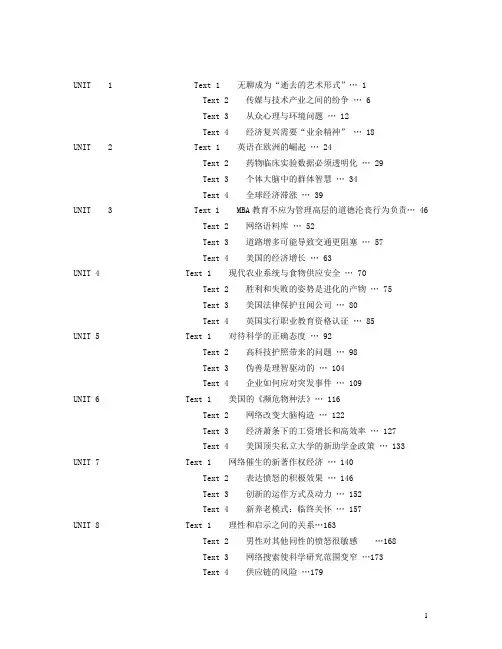
UNIT 1 Text 1 无聊成为“逝去的艺术形式” (1)Text 2 传媒与技术产业之间的纷争 (6)Text 3 从众心理与环境问题 (12)Text 4 经济复兴需要“业余精神” (18)UNIT 2 Text 1 英语在欧洲的崛起 (24)Text 2 药物临床实验数据必须透明化 (29)Text 3 个体大脑中的群体智慧 (34)Text 4 全球经济滞涨 (39)UNIT 3 Text 1 MBA教育不应为管理高层的道德沦丧行为负责 (46)Text 2 网络语料库 (52)Text 3 道路增多可能导致交通更阻塞 (57)Text 4 美国的经济增长 (63)UNIT 4 Text 1 现代农业系统与食物供应安全 (70)Text 2 胜利和失败的姿势是进化的产物 (75)Text 3 美国法律保护丑闻公司 (80)Text 4 英国实行职业教育资格认证 (85)UNIT 5 Text 1 对待科学的正确态度 (92)Text 2 高科技护照带来的问题 (98)Text 3 伪善是理智驱动的 (104)Text 4 企业如何应对突发事件 (109)UNIT 6 Text 1 美国的《濒危物种法》 (116)Text 2 网络改变大脑构造 (122)Text 3 经济萧条下的工资增长和高效率 (127)Text 4 美国顶尖私立大学的新助学金政策 (133)UNIT 7 Text 1 网络催生的新著作权经济 (140)Text 2 表达愤怒的积极效果 (146)Text 3 创新的运作方式及动力 (152)Text 4 新养老模式:临终关怀 (157)UNIT 8 Text 1 理性和启示之间的关系 (163)Text 2 男性对其他同性的愤怒很敏感 (168)Text 3 网络搜索使科学研究范围变窄 (173)Text 4 供应链的风险 (179)UNIT 9 Text 1 报纸社论歪曲气候真相 (186)Text 2 降低利率不能刺激欧元区经济 (191)Text 3 经济学家写无偿博客的影响 (197)Text 4 美国的TFA组织 (203)UNIT 10 Text 1 写博客有助自我治疗 (209)Text 2 网上汽车销售 (215)Text 3 美国食品及药物管理局受质疑 (220)Text 4 道德的“具身”结构 (226)UNIT 11 Text 1 医疗旅游现象 (233)Text 2 创造力的研究发现 (238)Text 3 印刷版报纸的衰落 (243)Text 4 亚洲教育应对东西文化兼收并蓄 (249)UNIT 12 Text 1 道德思考的方法 (255)Text 2 获奖项认可者更长寿 (260)Text 3 美国社会阶层的界限依然存在 (265)Text 4 环保与转基因食品 (270)UNIT 13 Text 1 技术移民有利于美国经济发展 (278)Text 2 沃尔玛的海外市场 (282)Text 3 英国政府帮助年轻人就业的政策 (289)Text 4 城市化进程 (294)UNIT 14 Text 1 美国两大航空公司的合并 (300)Text 2 书写的用途 (306)Text 3 美国贫富差距扩大 (311)Text 4 英国教师供求失衡 (316)UNIT 15 Text 1 放弃基础研究的代价 (323)Text 2 在线广告新模式 (329)Text 3 英国的知识创新能力 (334)Text 4 性别、种族和智力 (340)UNIT 16 Text 1 现代艺术危害西方社会 (346)Text 2 美国兴起解决无家可归的行动 (351)Text 3 美加之间的贸易摩擦 (356)Text 4 经济的进化 (362)Unit oneText 1Our mad attempts to avoid boredom uphold a profitable corner of the entertainment industry, while the variety of books, websites, TV programs and videos aimed at children and called “Boredom Killers” suggests that ennui has no age restriction. This is no new development—obsessive texting is hardly on a level with watching lions rip gladiators to shreds for entertainment, and, as the British public seem to be moving on to a stage where fox hunting is no longer seen as a justifiable, fun diversion, we must be doing something right. However, some experts have recently pointed out that obsessive avoidance of boredom (apart from being quite dull in itself—have you ever tried to have a decent (adj. 正派的;得体的)conversation with an extreme sports enthusiast?) denies(拒绝( deny的第三人称单数)) access to the certain kind of mental space which boredom brings and in doing so leaves us creatively and spiritually malnourished. In other words, boredom is becoming “a lost art form”.Steven Winn of the San Francisco Chronicle puts it in a recent article:“As more and more people seem to recognize, the universal experience of being bored—unengaged, detached, afloat in some private mental inactivity—may be far more precious, fruitful and even profound than a surface understanding might suggest. As ordinary as grey skies and equally pervasive, boredom deserves its own sun-splashed attention and celebration.”This is a very particular understanding of what boredom is, and perhaps this very problem of definition is what lies at the root of the supposed debate. On the one hand, boredom can be defined as a state of listlessness, a lack of interest in that which surrounds us and a general sense of ennui. Of this particular definition, Saul Steinberg wrote, “The life of the creative man is led, directed and controlled by boredom. Avoiding boredom is one of our most important purposes.” So in this case, boredom is something we flee from in horror.Another conception of boredom is of a blank, private mental space, invaluable for relaxing and for the fermentation of creative juices. It is this type of boredom which is considered by some to be a lost art form. Informational overload from all quarters means that there can often be very little time for personal thought, reflection, oreven just “zoning out”. With a mobile that is constantly switched on and a surplus of entertainments available to distract the naked eye, it is understandable that some people find it difficult to actually get bored in that particular restlessness, introspective kind of way. [418 words]1.The word “ennui”(Line 3, Para.1)most probably means .[A] avoiding boredom [B] lack of creativity [C] love of entertainment [D] the feeling of having nothing to do2.Boredom is becoming “a lost art form” because people .[A] are deprived of deep thought[B] are abandoning old-fashioned amusement[C] indulge in entertainment[D] have no private space3.According to Steven Winn, which of the following is true about boredom?[A] It is a common problem of human beings.[B] It is always feared by creative men.[C] It is important to recognize its significance.[D] It is more valuable than entertainment.4.From the passage, we can learn that boredom . [A] has two contradictory definitions[B] has both strong and weak points[C] is a source of art creation[D] is dying in the information age5.A suitable title for the passage might be . [A] Life without Boredom[B] The Influence of Modern Entertainment[C] Two Types of Boredom[D] The Significance of Boredom核心词汇Celebration(因网站显示原因,本处音标从略)n.庆祝;颂扬例:Her triumph was a cause for celebration. 她的胜利是庆祝的理由。
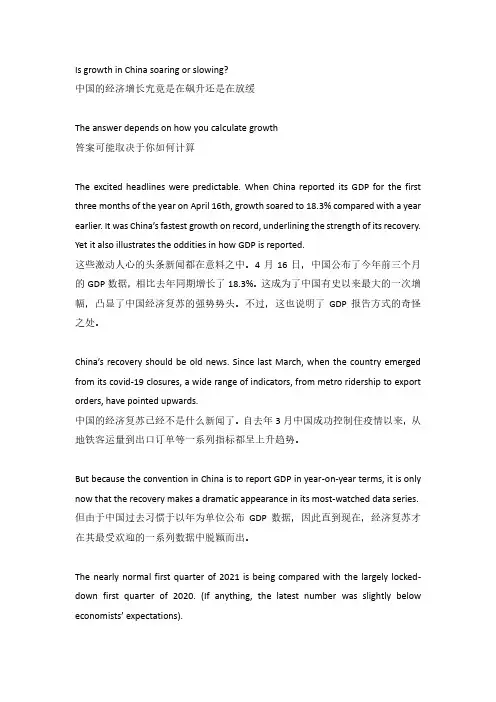
Is growth in China soaring or slowing?中国的经济增长究竟是在飙升还是在放缓The answer depends on how you calculate growth答案可能取决于你如何计算The excited headlines were predictable. When China reported its GDP for the first three months of the year on April 16th, growth soared to 18.3% compared with a year earlier. It was China’s fastest growth on record, underlining the strength of its recovery. Yet it also illustrates the oddities in how GDP is reported.这些激动人心的头条新闻都在意料之中。
4月16日,中国公布了今年前三个月的GDP数据,相比去年同期增长了18.3%。
这成为了中国有史以来最大的一次增幅,凸显了中国经济复苏的强势势头。
不过,这也说明了GDP报告方式的奇怪之处。
China’s recovery should be old news. Since last March, when the country emerged from its covid-19 closures, a wide range of indicators, from metro ridership to export orders, have pointed upwards.中国的经济复苏已经不是什么新闻了。
自去年3月中国成功控制住疫情以来,从地铁客运量到出口订单等一系列指标都呈上升趋势。
But because the convention in China is to report GDP in year-on-year terms, it is only now that the recovery makes a dramatic appearance in its most-watched data series. 但由于中国过去习惯于以年为单位公布GDP数据,因此直到现在,经济复苏才在其最受欢迎的一系列数据中脱颖而出。
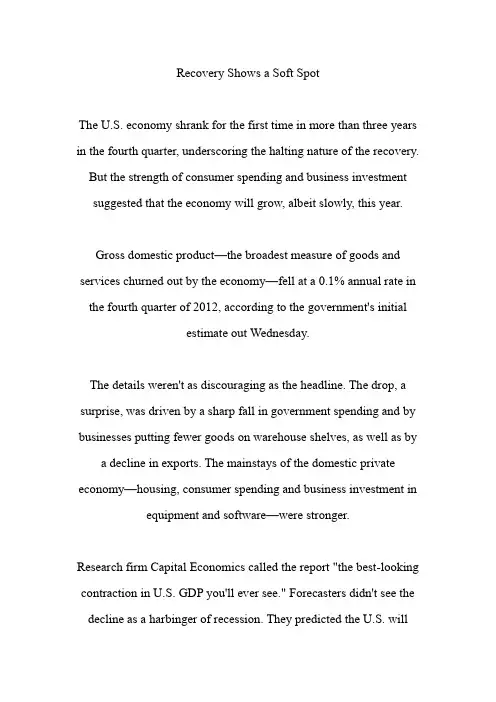
Recovery Shows a Soft SpotThe U.S. economy shrank for the first time in more than three years in the fourth quarter, underscoring the halting nature of the recovery. But the strength of consumer spending and business investment suggested that the economy will grow, albeit slowly, this year.Gross domestic product—the broadest measure of goods and services churned out by the economy—fell at a 0.1% annual rate in the fourth quarter of 2012, according to the government's initialestimate out W ednesday.The details weren't as discouraging as the headline. The drop, a surprise, was driven by a sharp fall in government spending and by businesses putting fewer goods on warehouse shelves, as well as bya decline in exports. The mainstays of the domestic private economy—housing, consumer spending and business investment in equipment and software—were stronger.Research firm Capital Economics called the report "the best-looking contraction in U.S. GDP you'll ever see." Forecasters didn't see the decline as a harbinger of recession. They predicted the U.S. willexpand at around a 2% pace in the current quarter, though the mood could shift Friday when the government releases its monthlysnapshot of the job market.Enlarge ImageClose.Investors pushed down stock prices but didn't seem overly worried either. The Dow Jones Industrial Average, which has been climbing steadily in past weeks, fell 44 points, to close at 13910.42.Acknowledging the fourth-quarter economic stall, Federal Reserve officials decided W ednesday to continue their $85 billion-per-month bond-buying programs in an effort to push down long-term interest rates and stimulate economic growth.In their statement after W ednesday's meeting, Fed policy makers said it appears that "growth in economic activity paused in recent months, in large part because of weather-related disruptions and other transitory factors." The Fed said it still saw downside risks to the economy, even though it expected a return to moderate growth in themonths ahead.The U.S. joined other advanced economies in reporting contractions in the final months of last year. The U.K., Germany, Spain and Belgium have said their economies shrank in the fourth quarter, and several more euro-zone members in coming weeks are expected to report their own declines. Budget cuts appear to be a leading factor driving the contractions in many of those nations.Deficit cutting in advanced economies is an important reason why global growth is expected to barely improve this year. The International Monetary Fund last week projected global growth of just 3.5% this year, a slight pickup from the estimated 3.2% growth in 2012, due partly to budget tightening in the U.S. and Europe. The International Monetary Fund expects advanced economies to expand just 1.4% this year, compared with 5.5% growth among developingeconomies.W ednesday's GDP report portrayed an economy stuck in low gear. For 2012, the economy grew 2.2%, up from the 1.8% growth of 2011, but still below the roughly 3% pace notched during healthiertimes.For now, the economy is riding largely on the backs of consumers.Consumer spending, adjusted for inflation, increased at a 2.2% rate in the fourth quarter, up from 1.6% in the third. That included a jump in spending on durable goods, which are big-ticket items such ascars and refrigerators.One thing that is helping consumers: They are starting to see substantial income gains after years of stagnation. The GDP report showed after-tax income rose at a rate of 6.8%, adjusted for inflation, the fastest pace since the recession.One company benefiting from stronger consumer spending is Nando'sPeri-Peri USA, a closely held chain of chicken restaurants in the W ashington, D.C., area. Same-store sales rose roughly 5% in the final months of 2012 compared with a year ago, said ChiefExecutive Burton Heiss.Mr. Heiss said he believes consumers are feeling more secure as housing and other parts of the economy improve. Higher home prices, for example, might be giving consumers the confidence to spend more freely on going out. Mr. Heiss added that the strength seems to be continuing: Sales have picked up slightly since the startof the year.U.S. companies stepped up investment in equipment and software during the quarter, with business investment rising at a rate of 8.4%, the strongest pace in a year. That defied expectations that companies would pull back due to worries over the "fiscal cliff" budget disputein W ashington.Still, those factors weren't strong enough to overcome declines in federal spending and exports and slower inventory growth.The slower inventory investment was the biggest factor behind the contraction. Businesses essentially sold items from warehouseshelves, rather than placing new orders with manufacturers.That may have been due to inventory accumulating too quickly last summer and some businesses becoming extra cautious about restocking. The upside is that with inventory levels now depleted, many businesses will be forced to replenish, possibly boostinggrowth in the current quarter.Meanwhile, government spending, which has been a drag on growth for more than two years, declined for the ninth time in 10 quarters.The biggest cuts came in military spending, which tumbled at a rate of 22.2%, the largest drop since 1972. But state and local spending also fell, dashing hopes of stabilization after a rare increase in thethird quarter.Military analysts said the decline likely was a result of pressure on the Pentagon from a number of areas.Among them: reductions in spending on the war in Afghanistan as it winds down, a downturn in planned military spending, a constraint placed on the Pentagon budget because the federal government is operating on short-term resolutions that limit spending growth, as well as concern that further cuts may be in the pipeline.Pentagon officials already have imposed tighter controls on military spending to deal with the challenges.David Berteau, a former Defense Department official who now heads the International Security Program at the Center for Strategic and International Studies in W ashington, said he was surprised by the sharp drop and predicted that persistent uncertainty about the defense budget would continue to be a drag on the nationaleconomy."Is this a blip in the data or is it a trend?" he said. "I think you'reseeing a trend."The effect of defense cuts on the economy in the fourth quarter likely raises the stakes of looming budget fights between the White House and congressional Republicans. The White House said the GDP report showed the need for Congress to avoid "self-inflictedwounds" and reach a deal.Companies tied to the defense industry already are bracing for cuts.Noel McCormick, president of McCormick Stevenson, a small engineering firm in Clearwater, Fla., that designs weapons for major defense contractors, said big clients have told him they may resort to layoffs and cut spending if cuts happen.That would have a "tremendous" impact on McCormick's 12-person company, he said, likely causing it to cut back as well."There is a great deal of angst associated in the coming months," Mr.McCormick said.。
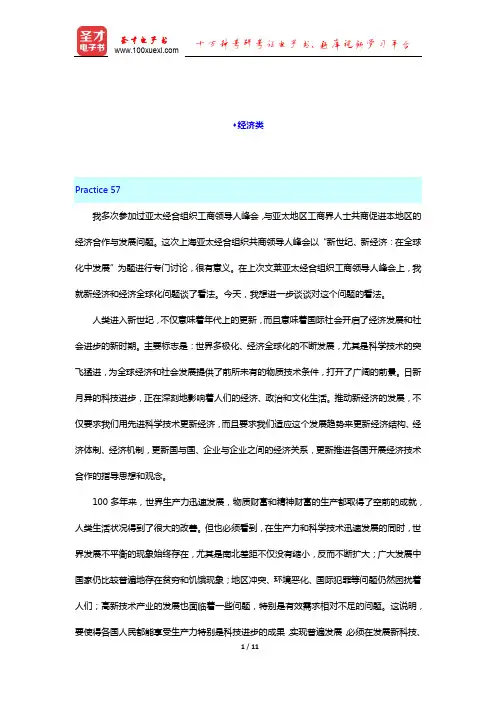
◆经济类Practice 57我多次参加过亚太经合组织工商领导人峰会,与亚太地区工商界人士共商促进本地区的经济合作与发展问题。
这次上海亚太经合组织共商领导人峰会以“新世纪、新经济:在全球化中发展”为题进行专门讨论,很有意义。
在上次文莱亚太经合组织工商领导人峰会上,我就新经济和经济全球化问题谈了看法。
今天,我想进一步谈谈对这个问题的看法。
人类进入新世纪,不仅意味着年代上的更新,而且意味着国际社会开启了经济发展和社会进步的新时期。
主要标志是:世界多极化、经济全球化的不断发展,尤其是科学技术的突飞猛进,为全球经济和社会发展提供了前所未有的物质技术条件,打开了广阔的前景。
日新月异的科技进步,正在深刻地影响着人们的经济、政治和文化生活。
推动新经济的发展,不仅要求我们用先进科学技术更新经济,而且要求我们适应这个发展趋势来更新经济结构、经济体制、经济机制,更新国与国、企业与企业之间的经济关系,更新推进各国开展经济技术合作的指导思想和观念。
100多年来,世界生产力迅速发展,物质财富和精神财富的生产都取得了空前的成就,人类生活状况得到了很大的改善。
但也必须看到,在生产力和科学技术迅速发展的同时,世界发展不平衡的现象始终存在,尤其是南北差距不仅没有缩小,反而不断扩大;广大发展中国家仍比较普遍地存在贫穷和饥饿现象;地区冲突、环境恶化、国际犯罪等问题仍然困扰着人们;高新技术产业的发展也面临着一些问题,特别是有效需求相对不足的问题。
这说明,要使得各国人民都能享受生产力特别是科技进步的成果,实现普遍发展,必须在发展新科技、新产业的同时,对经济结构、经济体制、经济机制进行改革和更新。
关键是要在世界经济事务中全面贯彻多边主义的合作发展精神。
不同民族、不同历史文化、不同社会制度和不同经济发展水平的国家和地区,应互相尊重,求同存异,取长补短,和平共处,协商合作,推动建立公正合理的国际政治经济新秩序,努力促进共同发展和繁荣。
这是解决目前世界经济发展中存在问题的根本出路,也是推动新经济进一步发展的必要条件。
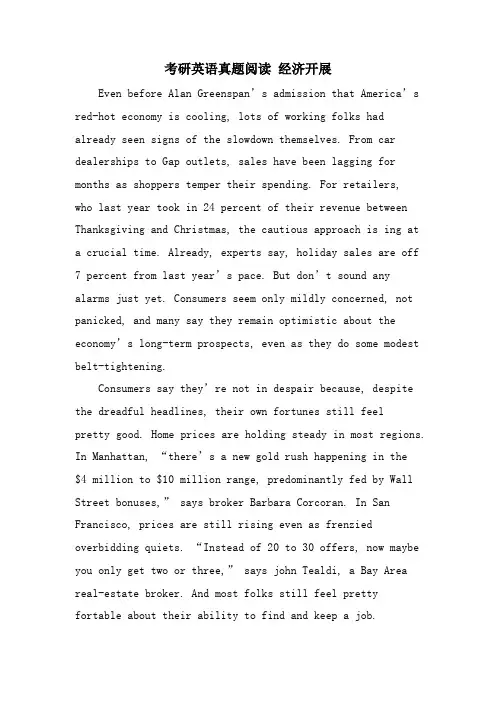
考研英语真题阅读经济开展Even before Alan Greenspan’s admission that America’s red-hot economy is cooling, lots of working folks had already seen signs of the slowdown themselves. From car dealerships to Gap outlets, sales have been lagging for months as shoppers temper their spending. For retailers, who last year took in 24 percent of their revenue between Thanksgiving and Christmas, the cautious approach is ing ata crucial time. Already, experts say, holiday sales are off7 percent from last year’s pace. But don’t sound any alarms just yet. Consumers seem only mildly concerned, not panicked, and many say they remain optimistic about the economy’s long-term prospects, even as they do some modest belt-tightening.Consumers say they’re not in despair because, des pite the dreadful headlines, their own fortunes still feelpretty good. Home prices are holding steady in most regions. In Manhattan, “there’s a new gold rush happening in the $4 million to $10 million range, predominantly fed by Wall Street bonuses,” says broker Barbara Corcoran. In San Francisco, prices are still rising even as frenzied overbidding quiets. “Instead of 20 to 30 offers, now maybe you only get two or three,” says john Tealdi, a Bay Area real-estate broker. And most folks still feel prettyfortable about their ability to find and keep a job.Many folks see silver linings to this slowdown.Potential home buyers would cheer for lower interest rates. Employers wouldn’t mind a little fewer bubbles in the job market. Many consumers seem to have been influenced bystock-market swings, which investors now view as a necessary ingredient to a sustained boom. Diners might see an upside, too. Getting a table at Manhattan’s hot newAlain Ducasse restaurant need to be impossible. Not anymore. For that, Greenspan & Co. may still be worth toasting.31. By “Ellen Spero isn't biting her nails just yet” (Line 1, Paragraph 1), the author means[A] Spero can hardly maintain her business.[B] Spero is too much engaged in her work.[C] Spero has grown out of her bad habit.[D] Spero is not in a desperate situation.32. How do the public feel about the current economic situation?[A] Optimistic. [B] Confused. [C] Carefree. [D] Panicked.33. When mentioning “the $4 million to $10 million range” (Lines 3, Paragraph 3), the author is talkingabout[A] gold market. [B] real estate. [C] stock exchange. [D] venture investment.34. Why can many people see “silver linings”to the economic showdown?[A] They would benefit in certain ways.[B] The stock market shows signs of recovery.[C] Such a slowdown usually precedes a boom.[D] The purchasing power would be enhanced.35. To which of the following is the author likely to agree?[A] A new boom, on the horizon.[B] Tighten the belt, the single remedy.[C] Caution all right, panic not.[D] The more ventures, the more chances.名师解析31. By“Ellen Spero isn't biting her nails justyet”(Line 1, Paragraph 1), the author means通过说“艾伦·斯拜罗还不至于咬手指”(第一段第一行),作者的意思是[A] Spero can hardly maintain her business. 斯拜罗几乎无法维持自己的生意。
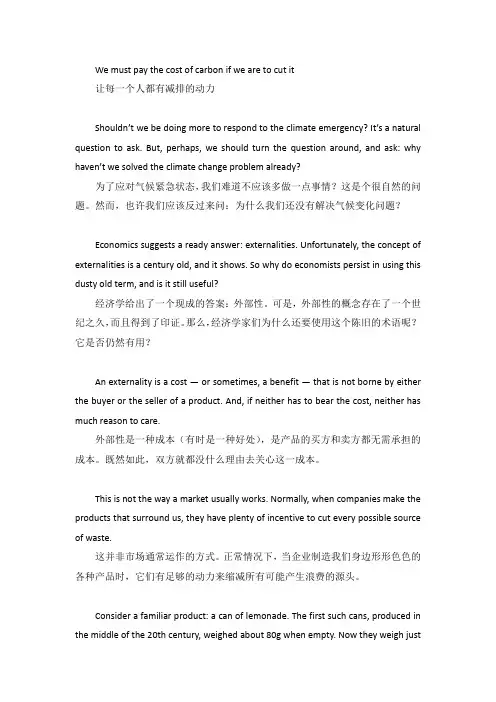
We must pay the cost of carbon if we are to cut it让每一个人都有减排的动力Shouldn’t we be doing more to respond to the climate emergency? It’s a natural question to ask. But, perhaps, we should turn the question around, and ask: why haven’t we solved the climate change problem already?为了应对气候紧急状态,我们难道不应该多做一点事情?这是个很自然的问题。
然而,也许我们应该反过来问:为什么我们还没有解决气候变化问题?Economics suggests a ready answer: externalities. Unfortunately, the concept of externalities is a century old, and it shows. So why do economists persist in using this dusty old term, and is it still useful?经济学给出了一个现成的答案:外部性。
可是,外部性的概念存在了一个世纪之久,而且得到了印证。
那么,经济学家们为什么还要使用这个陈旧的术语呢?它是否仍然有用?An externality is a cost — or sometimes, a benefit — that is not borne by either the buyer or the seller of a product. And, if neither has to bear the cost, neither has much reason to care.外部性是一种成本(有时是一种好处),是产品的买方和卖方都无需承担的成本。
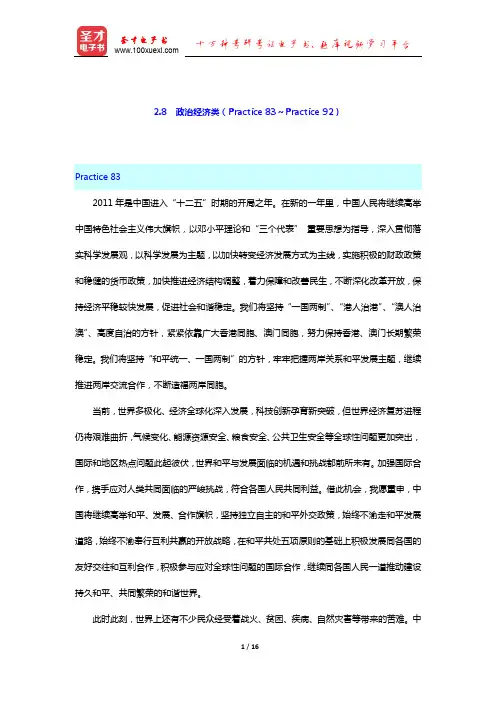
2.8 政治经济类(Practice 83~Practice 92)Practice 832011年是中国进入“十二五”时期的开局之年。
在新的一年里,中国人民将继续高举中国特色社会主义伟大旗帜,以邓小平理论和“三个代表”重要思想为指导,深入贯彻落实科学发展观,以科学发展为主题,以加快转变经济发展方式为主线,实施积极的财政政策和稳健的货币政策,加快推进经济结构调整,着力保障和改善民生,不断深化改革开放,保持经济平稳较快发展,促进社会和谐稳定。
我们将坚持“一国两制”、“港人治港”、“澳人治澳”、高度自治的方针,紧紧依靠广大香港同胞、澳门同胞,努力保持香港、澳门长期繁荣稳定。
我们将坚持“和平统一、一国两制”的方针,牢牢把握两岸关系和平发展主题,继续推进两岸交流合作,不断造福两岸同胞。
当前,世界多极化、经济全球化深入发展,科技创新孕育新突破,但世界经济复苏进程仍将艰难曲折,气候变化、能源资源安全、粮食安全、公共卫生安全等全球性问题更加突出,国际和地区热点问题此起彼伏,世界和平与发展面临的机遇和挑战都前所未有。
加强国际合作,携手应对人类共同面临的严峻挑战,符合各国人民共同利益。
借此机会,我愿重申,中国将继续高举和平、发展、合作旗帜,坚持独立自主的和平外交政策,始终不渝走和平发展道路,始终不渝奉行互利共赢的开放战略,在和平共处五项原则的基础上积极发展同各国的友好交往和互利合作,积极参与应对全球性问题的国际合作,继续同各国人民一道推动建设持久和平、共同繁荣的和谐世界。
此时此刻,世界上还有不少民众经受着战火、贫困、疾病、自然灾害等带来的苦难。
中国人民对他们的不幸遭遇抱着深深的同情,衷心希望他们早日摆脱困境。
中国人民将一如既往向他们提供力所能及的帮助。
我相信,只要各国人民携手努力,世界发展前景一定会更加美好,各国人民福祉一定会不断增进。
【参考译文】The year 2011 marks the beginning of China's implementation of the 12th Five-Year Plan for Economic and Social Development. In the upcoming year, we will unswervingly uphold the great banner of socialism with Chinese characteristics, deepen the implementation of the Scientific Outlook on Development under the guidance of Deng Xiaoping Theory and the important thought of Three Represents, pursue a path of scientific development, accelerate the change of development mode and structural adjustment, and maintain a proactive fiscal and stable monetary policy. We will pay more attention to deepening the reform and opening up and further improving people's welfare. We will make overall plans to guarantee a stable and relatively fast economic growth and social harmony and stability. We will uphold the principles of "one country, two systems", "Hong Kong people governing Hong Kong" and "Macao people governing Macao" with a high degree of autonomy. We will work together with our compatriots in Hong Kong and Macao to maintain long-term prosperity and stability in the two Special Administrative Regions. We will adhere to the Principles of "peaceful reunification and one country, two systems", and firmly grasp the theme of cross-Straits relations and peaceful development, strengthen the cross-Straits exchanges and cooperation, and bring continuous well-being to compatriots on both sides of the Taiwan Strait.At present, the world is moving further towards multi-polarity and globalization while the innovation of science and technology is brewing new breakthroughs. But, at the same time, the recovery of world economy is still facing many hardships; global issues such as climate change, energy, resources, food and public sanitary security are prominent; and international and regional hot spots are popping up. World peace and development face grave challenges. To strengthen global cooperation and meet the challenges in a joint way is to the best interest of the people of all countries. I would like to take this opportunity to reaffirm that China will uphold the banner of peace, development and cooperation and adhere to an independent and peaceful foreign policy. We will unswervingly take the road of peaceful development and implement a strategy of opening up for mutual benefit and win-win situation, actively develop friendly cooperation with all countries on the basis of the Five Principles of Peaceful Coexistence, actively participate in efforts by the international community to deal with the global issues, and strive to build a harmonious world with lasting peace and common prosperity.At this moment on this planet we inhabit, there are still people who are suffering the effects of war, poverty, sickness and natural disasters. The Chinese people have great sympathy for their pain, and are always willing to do all we can to help them overcome the difficulties. I believe, with sustained efforts of people of all countries, the world is sure to progress, and humanity's well-being is certain to improve.Practice 84我们必须加大对农业的支持力度。
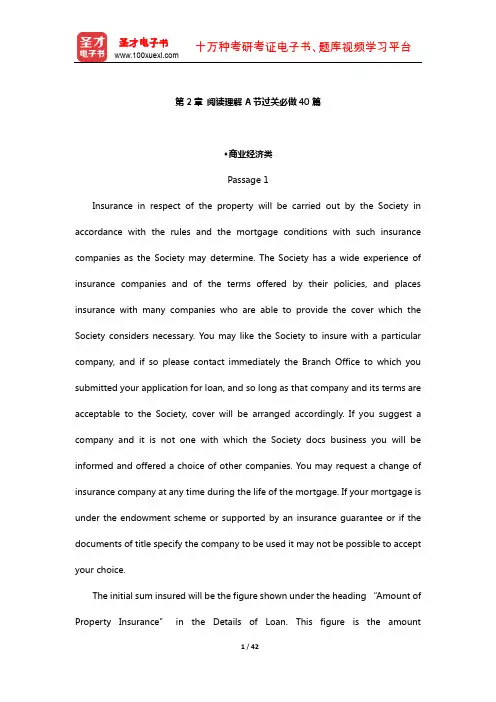
第2章阅读理解A节过关必做40篇◆商业经济类Passage 1Insurance in respect of the property will be carried out by the Society in accordance with the rules and the mortgage conditions with such insurance companies as the Society may determine. The Society has a wide experience of insurance companies and of the terms offered by their policies, and places insurance with many companies who are able to provide the cover which the Society considers necessary. You may like the Society to insure with a particular company, and if so please contact immediately the Branch Office to which you submitted your application for loan, and so long as that company and its terms are acceptable to the Society, cover will be arranged accordingly. If you suggest a company and it is not one with which the Society docs business you will be informed and offered a choice of other companies. You may request a change of insurance company at any time during the life of the mortgage. If your mortgage is under the endowment scheme or supported by an insurance guarantee or if the documents of title specify the company to be used it may not be possible to accept your choice.The initial sum insured will be the figure shown under the heading “Amount of Property Insurance” in the Details of Loan. This figure is the amountrecommended by the Society’s value as his estimate of the replacement cost of the building at the date of valuation, unless some other amount has been agreed in writing between you and the Society. No warranty is given or implied that the amount of insurance will cover complete loss.You are reminded that the market value of your property bears no relationship to the cost of replacement. The amount for which the property is insured should therefore represent not less than the cost, at the time of repair or replacement, of rebuilding all the property covered in the same materials, form, style and condition as when it is new. It should also include any architects’, surveyors’ and legal fees which may be payable, and any costs which may be subjected in complying with the requirements of the Local Authority and in removing debris, etc. The term “property” includes domestic outbuildings, garages, walls, landlords’ fixtures and fittings, etc., but excludes the value of the land.The market value of a house is therefore likely to be less than the cost of rebuilding, especially if the property is elderly. Even if the property is recently built, the work involved in reinstatement will be more expensive than the building cost which can be achieved by a builder building on an estate basis.1. The passage appears to be from ______.[A] a novel[B] an information booklet[C] a newspaper article[D] a formal speech2. The tone of this passage could best be described as ______.[A] academic[B] formal[C] light-hearted[D] subjective3. According to the passage, if the customer suggests an insurance companywhich has no business with the Society ______[A] it is impossible to change that company later on[B] the Building Society will not provide a loan[C] the Building Society will not accept responsibility for the policy[D] the Building Society may advise you to change another one4. The passage states that when you insure your property ______.[A] you should not take the land value into account[B] you should use the market value as a guide[C] you should take the advice of your Local Authority immediately[D] garage and garden sheds are not usually included5. The passage implies that rebuilding a property costs more than its market value ______.[A] only if the property is old[B] particularly if the property is new[C] whatever the age of the property[D] because of rising building costs【答案及解析】1.B 推理题。
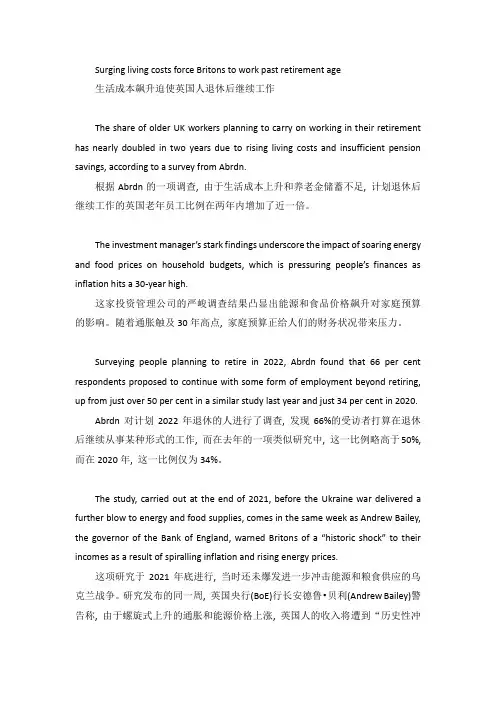
Surging living costs force Britons to work past retirement age生活成本飙升迫使英国人退休后继续工作The share of older UK workers planning to carry on working in their retirement has nearly doubled in two years due to rising living costs and insufficient pension savings, according to a survey from Abrdn.根据Abrdn的一项调查, 由于生活成本上升和养老金储蓄不足, 计划退休后继续工作的英国老年员工比例在两年内增加了近一倍。
The investment manager’s stark findings underscore the impact of soaring energy and food prices on household budgets, which is pressuring people’s finances as inflation hits a 30-year high.这家投资管理公司的严峻调查结果凸显出能源和食品价格飙升对家庭预算的影响。
随着通胀触及30年高点, 家庭预算正给人们的财务状况带来压力。
Surveying people planning to retire in 2022, Abrdn found that 66 per cent respondents proposed to continue with some form of employment beyond retiring, up from just over 50 per cent in a similar study last year and just 34 per cent in 2020.Abrdn对计划2022年退休的人进行了调查, 发现66%的受访者打算在退休后继续从事某种形式的工作, 而在去年的一项类似研究中, 这一比例略高于50%, 而在2020年, 这一比例仅为34%。
2018考研英语:阅读题中的经济类文章的常识第一篇:2018考研英语:阅读题中的经济类文章的常识凯程考研,为学员服务,为学生引路!2018考研英语:阅读题中的经济类文章的常识1.产能利用率(Capacity Utilization)产能利用率,也叫设备利用率,是工业总产出(total industrial output)对生产设备的比率。
简单的理解,就是实际生产能力到底有多少在运转发挥生产作用。
当产能利用率超过 95% 以上,代表设备使用率接近全部,通货膨胀(inflation)的压力将随产能无法应付而急速升高,在市场预期利率(market expected interest rate)可能升高情况下,对该国货币是利多。
反之如果产能利用率在 90% 以下,且持续下降,表示设备闲置过多,经济有衰退的现象,在市场预期利率可能降低情况下,对该国货币是利空。
2.自然失业率(Natural Rate of Unemployment)自然失业率指充分就业下的失业率。
自然失业率即是一个不会造成通货膨胀的失业率(Non-accelerating Inflation Rate of Unemployment,NAIRU),也是劳动市场处于供求稳定状态的失业率。
从整个经济看来,任何时候都会有一些正在寻找工作的人,经济学家把在这种情况下的失业称为自然失业率,所以,经济学家对自然失业率的定义,有时被称作“充分就业状态下的失业率”,有时也被称作无加速通货膨胀下的失业率。
例:America’s capacity utilization, for example, hit historically high levels earlier this year, and its jobless rate(5.6% in August)has fallen bellow most estimates of the natural rate of unemployment--the rate below which inflation has taken off in the past.(1997年T ext5)译文:例如,美国的生产力利用率在今年前段时间创下了历史高水平,而它的失业率(8月份为5.6%)已降至低于对自然失业率的大多数估测——过去当比率低于自然失业率时,通货膨胀率已急剧上升。
UNIT ELEVEN TEXT ONE “WHANG—Boom—Boom—cast delicacy to the winds.” Thus Ezra Pound in a letter to his father, urging the old man to help promote his first published collection. It might have been the poet's manifesto. Pound is as divisive a figure today as he was in his own lifetime. For some he was the leading figure of the Modernist movement who redefined what poetry was and could be; and who, in his role as cultural impresario, gave vital impetus to the literary careers of T.S. Eliot, James Joyce and Wyndham Lewis, among others. But for many Pound remains a freak and an embarrassment, a clinical nutcase and vicious anti-Semite who churned out a lot of impenetrable tosh before losing the plot completely. During the second world war he broadcast pro-Fascist radio programmes from Italy and later avoided trial for treason at home only because he was declared insane. On his release from St Elizabeth's Hospital near Washington, DC, he returned to Italy (“America is a lunatic asylum”), where he died in 1972 aged 87. David Moody, emeritus professor of English at York University, makes a strong case for Pound's “generous energy” and the “disruptive, regenerative force of his genius”. His approach (unlike Pound's) is uncontroversial. He follows the poet's progress chronologically from his childhood in Idaho—still, at the time of his birth in 1885, part of the wild west—to his conquest of literary London between 1908 and 1920. He marshals Pound's staggering output of poetry, prose and correspondence to excellent effect, and offers clear, perceptive commentary on it. He helps us to see poems, such as this famous, peculiarly haunting 19-syllable haiku, in a new light: The apparition of these faces in the crowd: Petals on a wet, black bough. That Mr Moody is constantly being upstaged by the subject of his study is not surprising. Pound was one of the most colourful artistic figures in a period full of them. According to Ford Madox Ford, who became a good friend of Pound's shortly after the bumptious young American arrived in London: “Ezra would approach with the step of a dancer, making passes with a cane at an imaginary opponent. He would wear trousers made of green billiard cloth, a pink coat, a blue shirt, a tie hand-painted by a Japanese friend, an immense sombrero, a flaming beard cut to a point and a single large blue earring.” W.B. Yeats's simple assessment was that: “There is no younger generation of poets. E.P. is a solitary volcano.” A great merit of Mr Moody's approach is the space he gives to Pound's writings. It is love-it-or-hate-it stuff, but, either way, undeniably fascinating. “All good art is realism of one kind or another,” Pound said. Reconciling that tidy statement with practically any of his poems is hard work but, as Mr Moody shows over and over again, hard work that offers huge rewards. His first volume ends in 1920, with Pound quitting London in a huff, finally fed up—after more than a decade of doing everything in his power to rattle the intellectual establishment—with “British insensitivity to, and irritation with, mental agility in any and every form”. His disgraceful radio programmes and the full blooming of his loopiness lie ahead. So, too, do most of his exquisite Cantos.
Declining populations:Incredible shrinking countriesDURING the second half of the 20th century, the global population explosion was the big demographic bogey. Robert McNamara, president of the World Bank in the 1970s, compared the threat of unmanageable population pressures with the danger of nuclear war. Now that worry has evaporated, and this century is spooking itself with the opposite fear: the onset of demographic decline.The shrinkage of Russia and eastern Europe is familiar, though not perhaps the scale of it: Russia’s population is expected to fall by 22% between 2005 and 2050, Ukraine’s by a staggering 43%. Now the phenomenon is creeping into the rich world: Japan has started to shrink and others, such as Italy and Germany, will soon follow. Even China’s population will be declining by the early 2030s, according to the UN, which projects that by 2050 populations will be lower than they are today in 50 countries.Demographic decline worries people because it is believed to go hand in hand with economic decline. At the extremes it may well be the result of economic factors: pessimism may depress the birth rate and push up rates of suicide and alcoholism. But, in the main, demographic decline is the consequence of the low fertility that generally goes with growing prosperity. In Japan, for instance, birth rates fell below the replacement rate of 2.1 children per woman in the mid 1970s and have been particularly low in the past 15 years.But if demographic decline is not generally a consequence of economic decline,surely it must be a cause?In a crude sense,yes. As populations shrink,GDP growth will slow.Some economies may even start to shrink,too.The result will be a loss of economic influence.Governments hate the idea of a shrinking population because the absolute size of GDP matters for great power status. The bigger the economy, the bigger the military, the greater the geopolitical clout: annual GDP estimates were first introduced in America in the 1940s as part of its war effort. Companies worry, too: they do not like the idea of their domestic markets shrinking. People should not mind, though. What matters for economic welfare is GDP per person.The crucial question is therefore what the effect of demographic decline is on the growth of GDP per person. The bad news is that this looks likely to slow because working age populations will decline more rapidly than overall populations. Yet this need not happen. Productivity growth may keep up growth in GDP per person: as labour becomes scarcer, and pressure to introduce new technologies to boost workers’ efficiency increases, so the productivity of labour may rise faster. Anyway, retirement ages can be lifted to increase the supply of labour even when the population is declining.People love to worry—maybe it’s a symptom of ageing populations—but the gloom surrounding population declines misses the main point. The new demographics that are causing populations to age and to shrink are something to celebrate. Humanity was once caught in the trap of high fertility and high mortality. Now it has escaped into the freedom of low fertility and low mortality. Women’s control over the number of children they have is an unqualified good—as is the average person’s enjoyment, in rich countries, of ten more years of life than they had in 1960. Politicians may fear the decline of their nations’economic prowess, but people should celebrate the new demographics as heralding a golden age.pressure[5preFE(r)]n.①压(⼒);②强制,压迫,压强;v.强制,迫使[真题例句] They can hope that, if one province includes a drug on its list, the pressure (n.①) will cause others to include it on theirs.[2005年新题型][例句精译]他们可能会认为如果⼀个省把⼀种药包括在⼀个药品名录单上,就会迫使其他省把这种药也包括在药品名录单上。
考研英语阅读理解B节(新题型)分类精讲商业经济类分类模拟(二) Reading ComprehensionA. Most of us know what it's like to stay in a job after it's stopped being satisfying, or to take on a project that's too big and be reluctant to admit it. CEOs have been known to allocate manpower and money to projects long after it becomes clear that they are failing. The costs to a person who does not know when to quit can be enormous. In economics it's known as sunk cost fallacy. While we recognize the fallacy almost immediately in others, it's harder to see in ourselves. Why?B. In one of their studies, they put participants into either a promotion or prevention focus. Next, each participant was told to imagine that he or she was CEO of an aviation company that had committed $10 million to developing a plane that can't be detected by radar. With the project near completion and $9 million already spent, a rival company announces the availability of their own radar-blank plane which is both superior in performance and lower in cost. The question put to CEOs was simple: do you invest the remaining $1 million and finish your company's plane, or cut your losses and move on?C. Sunk costs are the investments that you've put into something that you can't get back out. They are the years you spent training for a profession you hate. They are the thousands of dollars you spent on redecorating your living room, only to find that you hate living in it. Once you've realized that you probably won't succeed, or that you are unhappy with the results, it shouldn't matter how much time and effort you've already put into something.D. Recent research by Northwestern University psychologists Daniel Molden and Chin Ming Hui demonstrates an effective way to be sure you are making the best decisions when things go awry: Focus on what you have to gain by moving on, rather than what you have to lose. When people think about goals in terms of potential gain, that's a "promotion focus", which makes them more comfortable making mistakes and accepting losses. When people adopt a "prevention focus", they think about goals in terms of what they could lose if they don't succeed, so they become more sensitive to sunk costs. This is the focus people usually adopt, if unconsciously, when deciding whether or not to walk away. It usually tells us not to walk away, even when we should.E. There are several powerful, largely unconscious psychological forces at work. We may throw goodmoney after bad or waste time in a dead-end relationship because we haven't come up with an alternative; or because we don't want to admit to our friends and family, or to ourselves, that we were wrong. But the most likely cause is this innate, overwhelming aversion to sunk costs.F. The two researchers found that participants with a prevention focus stayed the course and invested the remaining $1 million roughly 80 percent of the time. The odds of making that mistake were significantly reduced by adopting a promotion focus: Those people invested the remaining $1 million less than 60 percent of the time. When we see our goals in terms of what we can gain, rather than what we might lose, we are more likely to see a doomed endeavor for what it is.G. As studies by behavioral economists like Daniel Kahnemen and Dan Ariely show, people is generally loss-averse. Putting in a lot, only to end up with nothing to show for it, is just too awful for most of us to seriously consider. The problem is one of focus. We worry far too much about what we'll lose if we just move on, instead of focusing on the costs of not moving on: More wasted time and effort, more unhappiness, and more missed opportunities.Order:1.答案:E[解答] 试题中首段已给出,研读后我们得知首段末句提出问题:我们一眼便能看出别人犯了“沉没成本谬误”,却很难发现自己身上这种毛病,这是为什么呢?这就要求下文必须对首段中提出的这个问题进行解答。
Plastic surgeons make a bundle despite Lebanon’s economic crisis尽管黎巴嫩遭遇经济危机,但整形外科医生还是赚了一大笔钱Many people have no jobs. Others, nose jobs许多人失业了,除了隆鼻医生Rhinoplasty has long been a rite of passage in Lebanon. Teenage girls want a dainty new nose in time for their graduation parties, celebrated in selfies. Lebanon’s many woes have not hindered the habit.隆鼻手术一直以来都是黎巴嫩人的一种成人礼。
十几岁的女孩想要一个精致的新鼻子,以便在毕业派对上自拍庆祝。
黎巴嫩的许多苦难并没有妨碍这种习惯。
Plastic surgeons are apparently making as much as or more than they did before an economic crisis, starting in 2019, that the World Bank has ranked as the third-worst anywhere, ever.从2019年开始,整形外科医生的收入显然与经济危机(世界银行将其列为有史以来最严重的第三大经济危机)前持平,甚至更高。
The World Health Organisation reckons that Lebanon’s economic meltdown prompted nearly 40% of the country’s doctors to leave. But for those who have stayed, the pickings, especially for nose jobs, may have increased. The pool of patients has stayed the same. There are fewer dexterous doctors to paddle in it.世界卫生组织估计,黎巴嫩的经济崩溃促使该国近40%的医生离开。
UNIT ELEVENTEXT ONE“WHANG—Boom—Boom—cast delicacy to the winds.” Thus Ezra Pound in a letter to his father, urging the old man to help promote his first published collection. It might have been the poet's manifesto.Pound is as divisive a figure today as he was in his own lifetime. For some he was the leading figure of the Modernist movement who redefined what poetry was and could be; and who, in his role as cultural impresario, gave vital impetus to the literary careers of T.S. Eliot, James Joyce and Wyndham Lewis, among others. But for many Pound remains a freak and an embarrassment, a clinical nutcase and vicious anti-Semite who churned out a lot of impenetrable tosh before losing the plot completely.During the second world war he broadcast pro-Fascist radio programmes from Italy and later avoided trial for treason at home only because he was declared insane. On his release from St Elizabeth's Hospital near Washington, DC, he returned to Italy (“America is a lunatic asylum”), where he died in 1972 age d 87.David Moody, emeritus professor of English at Y ork University, makes a strong case for Pound's “generous energy” and the “disruptive, regenerative force of his genius”. His approach (unlike Pound's) is uncontroversial. He follows the poet's progress chronologically from his childhood in Idaho—still, at the time of his birth in 1885, part of the wild west—to his conquest of literary London between 1908 and 1920. He marshals Pound's staggering output of poetry, prose and correspondence to excellent effect, and offers clear, perceptive commentary on it. He helps us to see poems, such as this famous, peculiarly haunting 19-syllable haiku, in a new light: The apparition of these faces in the crowd:Petals on a wet, black bough.That Mr Moody is constantly being upstaged by the subject of his study is not surprising. Pound was one of the most colourful artistic figures in a period full of them.According to Ford Madox Ford, who became a good friend of Pound's shortly after the bumptious young American arriv ed in London: “Ezra would approach with the step of a dancer, making passes with a cane at an imaginary opponent. He would wear trousers made of green billiard cloth, a pink coat, a blue shirt, a tie hand-painted by a Japanese friend, an immense sombrero, a flaming beard cut to a point and a single large blue earring.” W.B. Y eats's simple assessment was that: “There is no younger generation of poets. E.P. is a solitary volcano.”A great merit of Mr Moody's approach is the space he gives to Pound's writings. It is love-it-or-hate-it stuff, but, either way, undeniably fascinating. “All good art is realism of one kind or another,” Pound said. Reconciling that tidy statement with practically any of his poems is hard work but, as Mr Moody shows over and over again, hard work that offers huge rewards. His first volume ends in 1920, with Pound quitting London in a huff, finally fed up—after more than adecade of doing everything in his power to rattle the intellectual establishment—with “British insensitivity to, an d irritation with, mental agility in any and every form”. His disgraceful radio programmes and the full blooming of his loopiness lie ahead. So, too, do most of his exquisite Cantos.1. Pound was a divisive figurebecause_____[A] he brought both positive andnegative effect to the developmentof the Modernist movement. [B] he was both a poet and a person withmental problem.[C] he was politically a racist while hewas also pro-Fascist.[D] he was a man of complex andunintelligible personality.2. When Pound was released from hospital, he returned to Italy because_____[A] Italy was his hometown.[B] he was persecuted by Americans.[C] he disliked America.[D] he was out of his mind.3. Which one of the following statements is NOT true of David Moody‟s study on Pound?[A] His literary approach is unlike that of Pound‟s, being less contradictory. [B] He focuses on Pound‟s poetry itself instead of his personality, attempting to keep objective[C] He traces the poet‟s life in time order to study Pound‟s ac hievement.[D] His study offers a fresh sight of Pound…s work4.From Keats‟s simple assessment, it can be inferred that_____[A] Pound was of exploding power inhis literary creation.[B] Pound‟s achievement could hardly be reached by later poets.[C] Pou nd‟s excellence was unsurpassable in his time.[D] It would take a long time forPound‟s generation to fully understand him.5. The word “rattle”(Line 6, Paragraph 7) most probably means _____[A] set up.[B] destroy.[C] struggle.[D] disturb.文章剖析:这篇文章主要介绍了Pound的两个不同侧面。
考研英语阅读理解精读100篇之经济类 unit1 unit1
Some of the concerns surrounding Turkey’s application to join the European Union, to be voted on by the EU’s Council of Ministers on December 17th, are economic-in particular, the country’s relative poverty. Its GDP per head is less than a third of the average for the 15 pre-2004 members of the EU. But it is not far off that of one of the ten new members which joined on May 1st 2004 (Latvia), and it is much the same as those of two countries, Bulgaria and Romania, which this week concluded accession talks with the EU that could make them full members on January 1st 2007.
Furthermore, the country’s recent economic progress has been, according to Donald Johnston, the secretary-general of the OECD, "stunning". GDP in the second quarter of the year was 13.4% higher than a year earlier, a rate of growth that no EU country comes close to matching. Turkey’s inflation rate has just fallen into single figures for the first time since 1972, and this week the country reached agreement with the IMF on a new three-year, $10 billion economic programme that will, according to the IMF’s managing director, Rodrigo Rato, "help Turkey... reduce inflation toward European levels, and enhance the economy’s resilience".
Resilience has not historically been the country’s economic strong point. As recently as 2001, GDP fell by over 7%. It fell by more than 5% in 1994, and by just under 5% in 1999. Indeed, throughout the 1990s growth oscillated like an electrocardiogram recording a violent heart attack. This irregularity has been one of the main reasons (along with red tape and corruption) why the country has failed dismally to attract much-needed foreign direct investment. Its stock of such investment (as a percentage of GDP) is lower now than it was in the 1980s, and annual inflows have scarcely ever reached $1 billion (whereas Ireland attracted over $25 billion in 2003, as did Brazil in every year from 1998 to 2000).
One deterrent to foreign investors is due to disappear on January 1st 2005. On that day, Turkey will take away the right of virtually every one of its citizens to call themselves a millionaire. Six noughts will be removed from the face value of the lira; one unit of the local currency will henceforth be worth what 1m are now-ie, about €0.53 ($0.70). Goods will have to be priced in both the new and old lira for the whole of the year, but foreign bankers and investors can begin to look forward to a time in Turkey when they will no longer have to juggle mentally with indeterminate strings of zeros.
注(1):本文选自Economist;12/18/2004, p115-115, 2/5p; 注(2):本文习题命题模仿2004年真题text 1第1题和第3题(1,3),2001年真题text 1第2题(2),1999年真题text 2第2题(4)和2002年真题text 3第4题(5); 1. What is Turkey’s economic situation now? [A] Its GDP per head is far lagging behind that of the EU members. [B] Its inflation rate is still rising. [C] Its economy grows faster than any EU member. [D] Its economic resilience is very strong.
2. We can infer from the second paragraph that__________. [A] Turkey will soon catch the average GDP level of the 15 pre-2004 EU members [B] inflation rate in Turkey used to be very high [C] Turkey’s economy will keep growing at present rate [D] IMF’s economic program will help Turkey join the EU
3. The word “oscillated” (Line 3, Paragraph 3) most probably means_________. [A] fell [B] climbed [C] developed [D] swang
4. Speaking of Turkey’s foreign direct investment, the author implies that_________. [A] it’s stock is far less than that of other countries [B] it does not have much influence on Turkey’s economic progress [C] steady GDP growth will help Turkey attract more foreign direct investment [D] Turkey’s economic resilience relies on foreign direct investment
5. We can draw a conclusion from the text that__________. [A] foreign investment environment in Turkey will become better [B] Turkey’s citizens will suffer heavy loss due to the change of the face value of the lira [C] the local currency will depreciate with the removal of six noughts from the face value [D] prices of goods will go up 答案:C B D C A 篇章剖析 本篇文章是一篇说明文,介绍了土耳其的经济状况。第一段将土耳其的经济情况和其他几个欧盟新成员国的经济情况进行了一下对比,说明土耳其的经济状况并非如人们担心的那样糟糕;第二段对土耳其这几年的经济增长情况进行了简要介绍;第三段说明土耳其的经济缺乏弹性以及由此带来的影响;最后一段说明妨碍投资者的一个因素即将消失。
词汇注释 GDP: 国内生产总值(gross domestic product) accession: [] n. 添加, 增加 OECD: 经合,经济合作与发展组织 (Organization for Economic Co-operation and Development) resilience: [] n. 弹回, 有弹力, 恢复力, oscillate: []v. 振荡 electrocardiogram: [☺☺] n. .[医]心电图, 心动电流图(略作ECG) inflow: [] n. 流入, 流入物 deterrent: [di5tE:rEnt] n. 阻碍物 nought: [] n. 无, 零 lira: [] n. 里拉 juggle: [] v. (常与with连用)耍杂耍 indeterminate: [] adj. 在程度、体积、性质或数量上没有准确确定的